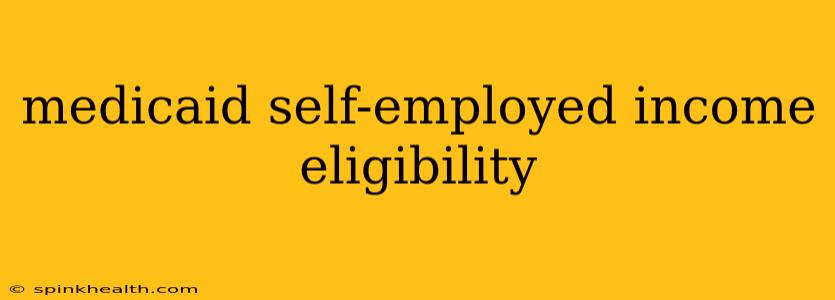Navigating the Maze: Medicaid Eligibility for the Self-Employed
The world of self-employment offers freedom and flexibility, but it can also present challenges when it comes to healthcare. Securing affordable healthcare, especially if you're relying on Medicaid, can feel like navigating a complex maze. This article aims to illuminate the path to understanding Medicaid eligibility for self-employed individuals, addressing the common questions and concerns along the way. Let's unravel the complexities together.
Imagine Sarah, a talented freelance graphic designer. She loves the autonomy of her work, but the unpredictable nature of her income makes her anxious about healthcare costs. Sarah's story is common among the self-employed. Understanding the rules surrounding Medicaid eligibility is crucial for securing the healthcare coverage they need.
What Income Counts Towards Medicaid Eligibility for the Self-Employed?
This is often the first and most crucial question. Medicaid eligibility isn't solely determined by a single number. It depends heavily on your state's specific rules and your overall financial situation. Generally, your net income, the amount you earn after deducting business expenses, is what matters most. Think of it as the money you actually take home after covering the costs of running your business. This can include income from various sources tied to your self-employment, such as:
- Profits from your business: This is the most significant factor, representing your earnings after expenses.
- Contract work: Payments received for individual projects.
- Gig work: Income generated through platforms like Uber or DoorDash.
- Rental income (if applicable): If you own rental properties, this income is typically included in the calculation.
What Expenses Can I Deduct When Calculating Net Income for Medicaid?
The good news is that many business expenses are deductible when calculating your net income for Medicaid eligibility. This is where keeping meticulous records is vital. Documentation is your best friend in this process. Common deductible expenses often include:
- Supplies and materials: Costs directly related to producing your goods or services.
- Rent or mortgage payments (for business space): If you operate your business from a dedicated workspace.
- Utilities (business portion): The part of your utility bills used for business purposes.
- Insurance (business-related): This includes liability insurance and other relevant policies.
- Professional fees: Costs related to accounting, legal, and other professional services.
How Do I Prove My Income and Expenses to Medicaid?
The application process often involves submitting detailed financial documentation. Being prepared significantly streamlines this process. You’ll likely need to provide:
- Tax returns (Form 1040 and Schedule C): These are essential for demonstrating your income and expenses.
- Bank statements: These help verify your income and expenses.
- Invoices and receipts: Detailed records of your income and expenses are crucial for accurate calculation.
What Assets Are Considered When Determining Medicaid Eligibility?
Beyond income, some states consider your assets. This can include things like:
- Savings accounts: The balance in your savings and checking accounts.
- Investments: Stocks, bonds, and other investments.
- Real estate (excluding your primary residence): The value of any properties you own, excluding your primary home.
- Vehicles: The value of your vehicles.
How Often Do I Need to Report Changes in Income or Assets?
Medicaid eligibility isn't a one-time determination. You'll usually need to report any significant changes in your income or assets to your state Medicaid agency. Failure to do so could result in the loss of benefits. Be proactive and notify them promptly if your circumstances change.
What if My Income Fluctuates?
The unpredictable nature of self-employment income is a common concern. Many states recognize this and have provisions for considering income fluctuations. They may look at your average income over a certain period or take into account any periods of lower income due to illness or other unforeseen circumstances. It's crucial to explain your situation clearly and completely during the application process.
Remember, Medicaid eligibility requirements vary significantly from state to state. Contact your state's Medicaid agency for specific details and personalized guidance. Navigating the system might seem daunting, but with thorough preparation and a clear understanding of the requirements, you can increase your chances of securing the healthcare coverage you deserve.

